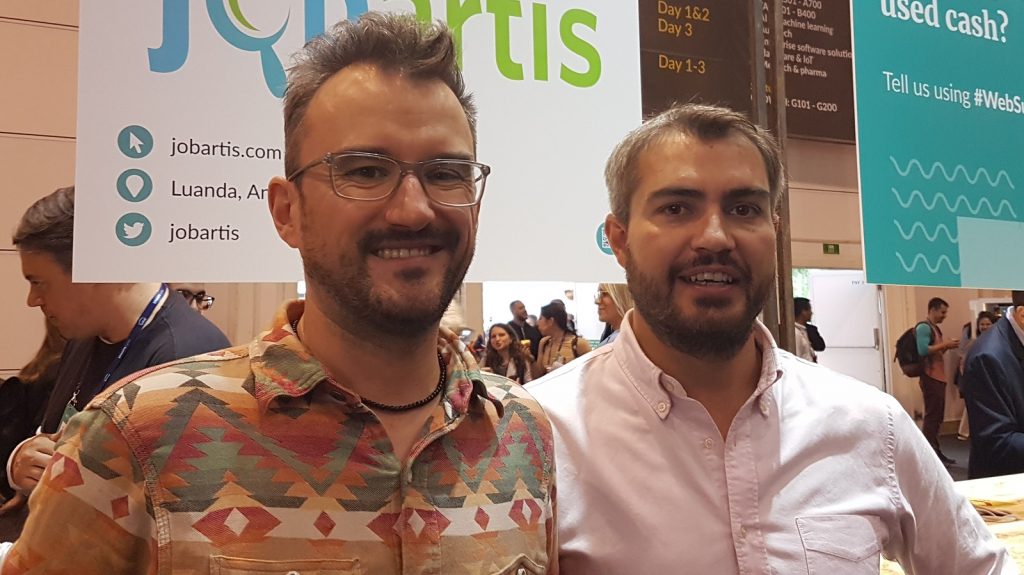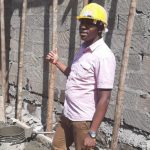Artificial Intelligence (AI) is no longer just a buzzword. It is embedded in everyday work, from drafting emails to automating entire workflows. For Memeburn’s…
Despite challenges, Africa is attractive for expat founders, says Jobartis man [Q&A]

Africa, with its vast number of business opportunities and low competition, holds great possibilities for foreign tech entrepreneurs, says Adrian Vinuales, the Spanish co-founder of Angolan jobs website Jobartis.
“It is easy to think of doing solid business using ideas that work already in Europe, and work on those to create new business models that work in Africa, becoming a pioneer and creating a real impact in those countries helping people to solve real problems like access to education, employment and much more,” Vinuales told Ventureburn.
The biggest challenge is not the red tape or low internet penetration, but the lack of local venture capitalists, admits Vinuales (pictured above, right with fellow co-founder Maciej Lotkowski at Web Summit, Portugal earlier this month).
Biggest challenge in Africa for foreign tech entrepreneurs is lack of VCs, says Jobartis founder
“Today the local investor in not yet that savvy like in other markets and trying also to bring the attention of VCs from overseas is not an easy task,” says Vinuales.
In the below Q&A, Vinuales details more about Jobartis, how the company started and his views on online jobs platforms in Africa.
When was the company started and how did the three co-founders meet?
Jobartis started mid-2013, founded by Luis Verdeja (who is the CEO) and Adrian Vinuales (both of whom are Spanish) and Maciej Lotkowski (who is Polish) starting its first online job board operation in Angola.
Luis and I met in Angola and we both already had experience in Africa, working in HR and consultancy, and Maciej (friend of friends) had just left working as CTO of one of the biggest online job boards in Spain at that time (JobsandTalent) and had all the necessary knowledge to develop a job board from scratch.
How much in funding have you raised so far?
We have raised four rounds with close to €2-million in funding from many different small and big angel investors, related to online job classifieds in Africa, Asia and in Europe (can’t disclose names). And also from one (US-based) VC, the Venture City.
How much of your own capital have you put in?
The project started with close to €40 000 of our own capital. After that we started a small round from family and friends, raising the rest of it to kick off the project.
Since the conditions in Angola at that time were really difficult, and at the same time Luanda was considered the most expensive city in the world for expats, we had to start focusing on revenue from the start, not just focusing on growth like many other online projects.
How much revenue per year is the company currently generating and how many employees do you have?
The company is generating close to $1-million in revenues from its main operation in Angola, where it has around 40 employees, and growing every year since we started.
The company has more than doubled revenue and personnel, despite the oil and currency crisis the country has been through.
How many listings do you currently have on your site? Which markets are you operating in?
Jobartis Angola has posted already over 30 000 listings, and last year we started operating in other countries in the region, namely the Republic of Congo, Cameroon, Zambia and Gabon. Those new countries are now picking up with really good traffic and traction.
Two years after founding Jobartis, we created together with our co-founder Farah Mulji, a new venture called Educartis, an education listing with pan-African focus, which operates in Angola and Kenya.
Where is the company registered and do you have local entities in the markets you operate in?
We do have a local entity in Angola, and this year we will be deploying local operations in the new regions we have expanded to.
We believe that for this type of online business, it is critical to be a locally recognised entity with local operations close to our customers and candidates trying to offer the best service and customer support.
We also have a legal entity in Europe, for funding purposes and also for server location and brand or intellectual property rights safekeeping.
Who is your competition in Angola and the rest of Africa?
In Angola we do not have online direct competition, as today there are no other job boards operating here. Jumia started operations in Angola but left after some time.
With regards to the other countries where we have launched, there are no solid local competitors, that was the main reason why we selected those countries, as we did in Angola.
Avoiding competitors and deploying excellent local operations has been our success formula for our minimum viable product (MVP) in Angola and what we plan to repeat in the new countries.
Slowly, our “new” competition in Angola is the recruitment agencies and local HR companies.
Our recruitment brand in Angola and recognition among clients is so high, that slowly our clients have demanded more services.
So, as market leaders we have adapted to our clients needs by offering a wide range of “offline” services like CV filtering, full recruitment and selection and manpower services, based on our new developed technology platform that allow us to be more efficient than any traditional recruitment agency and win that market segment too.
We believe that this situation might be common in markets with one clear leader, like it is with Jobartis in Angola.
As market leader, the client approach is different in that in other highly competitive markets, one can set the pace of business. For example, in Europe, where there are many online job boards, that is less likely to happen. Only in Denmark, where Job Index has the monopoly, do they do the same.
As the same happens in Africa with many other examples of clear market leaders in Nigeria (Jobberman), Kenya (Brighter Monday) or Ethiopia (EthioJobs). In other mature markets like South Africa with many competitors, that doesn’t happen.
What competitions have you won and what accelerator programmes, if any, have you taken part in?
As one of the first successful tech startup projects in Angola, Jobartis has won many of the first local competitions for digital projects in Angola.
We won the first edition of Seedstars in Angola, as well as becoming a mentor of organisations like the Founders Institute, Seedstars and others. Jobartis also participated in The Venture City’s accelerator programme in Spain.
What are your plans for the future now? When are you planning to enter DRC?
Our short-to-medium term plan is to expand into the new regions where we have soft launched and build a solid local capacity for each country. In the long term, we could look to expand to new markets where we feel that there is a need for our services.
What advice do you have for those who are looking to come from overseas and set up a startup in Africa?
I would recommend to any entrepreneurs who want to start a tech business in Africa to definitely come, there are many opportunities in markets with low competition.
It is easy to think of doing solid business using ideas that work already in Europe, and work on those to create new business models that work in Africa, becoming a pioneer and creating a real impact in those countries helping people to solve real problems like access to education, employment and much more.
Of course in many countries in Africa, mostly in East, West and Southern Africa, you can find some issues with red tape or low internet penetration, but for us the biggest challenge is the lack of local VCs and funding available in the local tech ecosystems.
Today the local investor in not yet that savvy like in other markets, and trying also to bring the attention of VCs from overseas is not an easy task. That funding is key to the development of those small tech startups in the region, and with more available solutions, that brings also more tech education and will of internet usage.
Featured image: Jobartis founder Maciej Lotkowski and Adrian Vinuales (not present is Luis Verdeja) at Web Summit, Portugal earlier this month (Stephen Timm)

